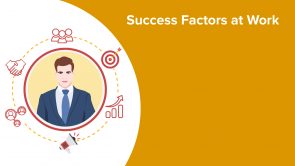Productivity (part 1): factors to work efficiently

About the Lecture
The lecture Productivity (part 1): factors to work efficiently by Michael Schmitz is from the course Success Factors at Work. It contains the following chapters:
- Effective > Efficient
- Productivity enables opportunities
- Goal setting: Happiness
- Self-Management
- Brains are expensive
- Rider or Elephant
- Why do we procrastinate?
- The perfect task: Unstoppable!
- Flow
Included Quiz Questions
What is more important if you want to be productive?
- Effectiveness
- Efficiency
- Results
- Performance
If you think long-term and want to make use of opportunities, …
- transferable skills are more important than technical skills because they help us to go up in terms of management.
- technical skills are more important than transferable skills because they help us to go up in terms of management.
- neither technical nor transferable skills are important.
- transferable skills are more important than technical skills because they help us to stay in a certain line.
Lack of self-management leads us to procrastinate, because ...
- our brain tries to keep us from unrewarding or dangerous tasks.
- we are too lazy to work.
- it is difficult to get started when we are tired.
- our brain tries to keep us away from rewarding tasks.
Task delay is likely when …
- The task has to be performed perfectly.
- Somebody else judges the result
- Deadlines are not set or can be moved.
- The working steps are defined.
- The criteria for final judgment are clear.
What elements does the perfect task include among others?
- You judge the results.
- It is enough to simply start the task
- The deadline is immovable.
- You do not need to complete the task right now.
- You do not identify the most important steps.
When can we perform a task the easiest?
- When we work in a group.
- When we work alone on something simple, but slightly boring.
- When we work alone and are tired. The task is not dangerous, but slightly boring.
- When we work alone, are healthy and motivated. The task is slightly unrewarding.
What are the various factors that determine whether you reach the flow phase and how long does it take on average to reach that phase?
- It takes 15 minutes on average to reach that state. The factors are: a state of focus and immersion in task at hand; relevant brain parts active; no pressing bodily needs or interrupts.
- It takes 10 minutes on average to reach that state. The factors are: a state of focus and immersion in task at hand; relevant brain parts active; no pressing bodily needs or interrupts.
- It takes 15 minutes on average to reach that state. The factors are: a state of focus and immersion in task at hand; relevant brain parts inactive; no pressing bodily needs or interrupts.
- It takes 10 minutes on average to reach that state. The factors are: a state of focus and immersion in task at hand; relevant brain parts inactive; no pressing bodily needs or interrupts.
What is not productive?
- Multitasking
- Working alone in silence
- Creating draft papers together
- Meetings without agenda
These courses may be of interest to you
Customer reviews
5,0 of 5 stars
| 5 Stars |
|
5 |
| 4 Stars |
|
0 |
| 3 Stars |
|
0 |
| 2 Stars |
|
0 |
| 1 Star |
|
0 |
Excerpts from the accompanying material
... Find new customers? Lower costs? Build ...
... Serotonin, Dopamin, Endorphin Brain dislikes Effort without reward. ...
... to be performed today Deadlines are not set or can be moved. We do not have social support on this task and will have to hunt alone. We never did this kind of task and ...
... You defined a few relevant criteria. You judge the result. You identify the most important steps. Bad results can be improved upon later. Only constructive criticism is allowed and received. You ...
... in task at hand. Relevant brain parts active, others ...
... are incredibly exciting for you animal? Useless? Avoid them! Useful? Do it again! ...



